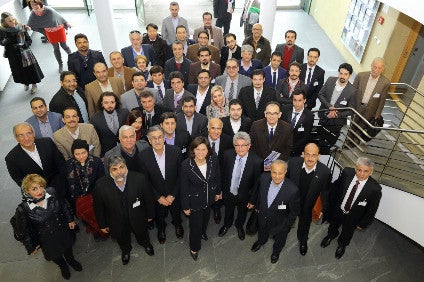
Bavaria’s Industry Association (VBW) says the financial complexity of dealing with Iran remains problematic with “severe improvement” needed to smooth transactions, despite the recent lifting of sanctions.
Punitive economic measures were levied for decades as a nervous West flexed its financial muscles against an administration some thought could be enriching uranium for use in possible nuclear weapons development, but their lifting still makes credit access extremely challenging.

Discover B2B Marketing That Performs
Combine business intelligence and editorial excellence to reach engaged professionals across 36 leading media platforms.
Tehran’s emergence from 30 years of being cold shouldered by a hostile West has presented the automotive industry – suppliers in particular – with what could be a future 3m market – but there are still significant obstacles to hurdle before normalised trade becomes routine.
The Bavarian Industry Association – Vereinigung der Bayerischen Wirtschaft – recently set up a liaison office in Tehran with an eye to its component sector undertaking business with Iran – but cautions of the need to tread warily when it comes to finance.
“At present, financing trade with Iranian companies is still difficult,” VBW CEO, Bertram Brossardt, told just-auto from Munich. “The economy needs a severe improvement in the execution of financial transactions with Iranian business partners. Here we look to the banks to ensure payments can be made easily and reliably.
“For the Iranian economy, ongoing unemployment, which is expected to remain around 12%, poses great challenges. The skills shortage has a negative outcome for the economy.”
Despite the difficulties, the VBW chief insists there is “great potential” in the mechanical engineering sector, with 30% of Bavarian exports to Iran already falling within the segment.
Additionally, demand for German products and services in energy efficiency and climate protection, as well as in the chemical industry, pharmaceuticals and medicine technology, is growing.
“We see particularly interesting opportunities within the automotive industry,” added Brossardt. “In connection with a recent visit by the Tehran Chamber of Commerce, Industries, Mines and Agriculture to Munich on our invitation, the Bavarian Industry Association signed a Memorandum of Understanding with the Iranian Auto Parts Manufacturers Association.
“Germany, particularly Bavaria, and Iran have a long history of trade relations. At its peak in 1976, 2.6% of Bavaria’s exports went to Iran. The introduction of the sanctions in 2006 and their tightening in 2012, led to a strong decrease in trade activity.
“Yet, the quality of German and Bavarian products and the reliability of our companies continue to be highly valued by our Iranian partners. Now the sanctions are gradually being lifted, we are determined to exploit business opportunities fully by building on our past contacts.”






